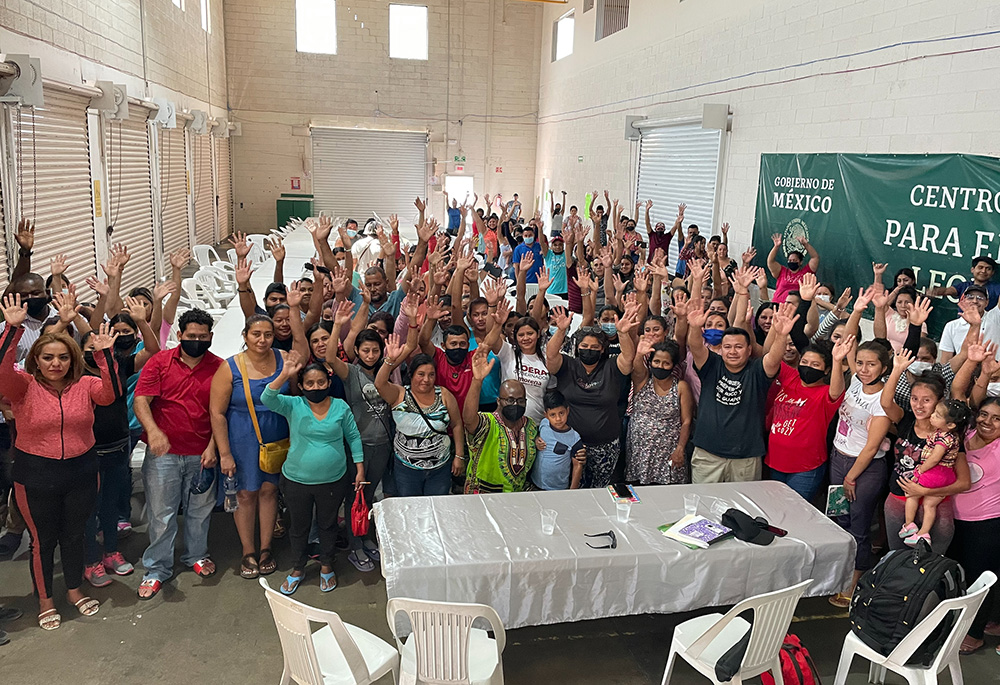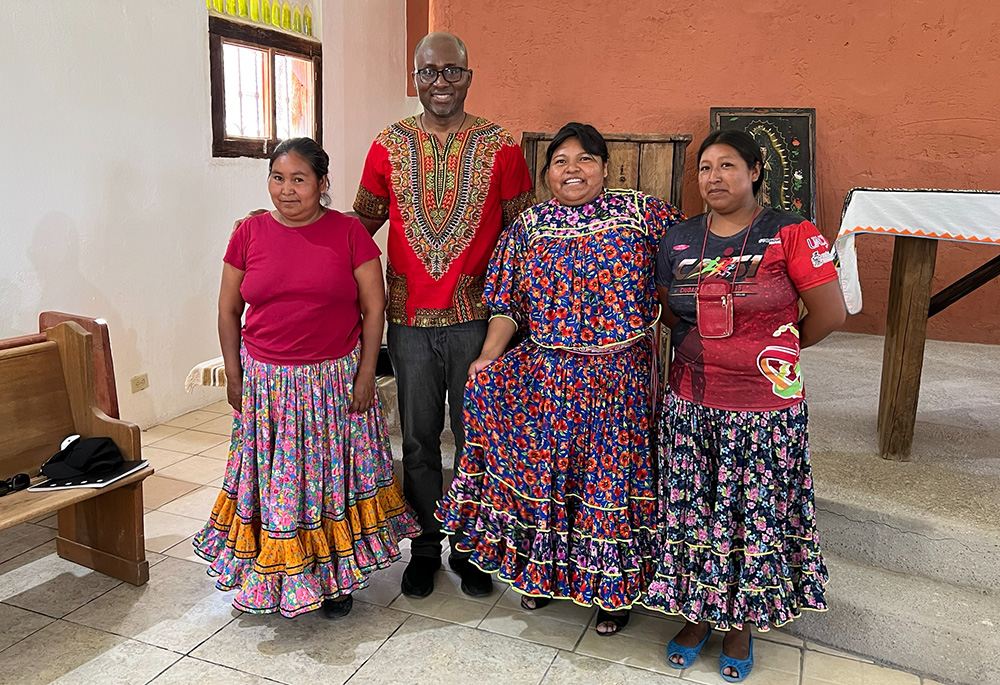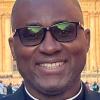
Fr. Stan Chu Ilo, center, wearing green, poses with people at a holding center for migrants in Ciudad Juarez, Mexico. Ilo and others interviewed the people at the center for the Vatican's "Doing Theology from the Existential Peripheries" project. (Courtesy of Stan Chu Ilo)
I have a stone on my private altar given to me by Alejandro. When his brother disappeared in Cuidad Juárez, Mexico, three years ago, Alejandro went back to the place where they said goodbye to each other for the last time as his brother boarded the bus to Mexico City. There, he took some stones from that ground that serve as the only point of connection between him and his brother today.
"Take this stone, Father," Alejandro said to me, "and keep it on your altar and don't forget my brother because the church should never forget those who are lost."
Alejandro was one of the representatives who met with the North American working group of the "Doing Theology from the Existential Peripheries" project sponsored by the Migrants and Refugees Section of the Vatican Dicastery for Promoting Integral Human Development. The project was launched in response to Pope Francis' desire to hear from seldomly heard Catholics.
Alejandro's connection with the church has been a mixed bag. After searching for his brother for three years, he went to his local parish to seek spiritual guidance. When he could not get an appointment to see the parish priest, he decided to go to the confessional, knowing that the priest would be there. When he asked the priest, "Why is God not hearing my prayers in my search for my only brother who disappeared three years ago?" the priest bolted out a terse judgment, assuming his brother was a drug gang member: "Your brother is in hell."
Alejandro left the church broken, battered and deeply hurt. He has never stepped into a church since then.
He did, however, find a church community outside the formal structures of the institutional church at Solidarity for Human Dignity (Centro de Derechos Humanos), a center in Cuidad Juárez run by some Catholics and other Christian groups. Here, he found solidarity with so many other families who, holding on to faith and hope in God, continue to meet every week to pray and strategize on how to find their missing family members. When Alejandro heard that there were some people sent by Pope Francis to talk with them at this center, he was happy to meet us.
Welcome to the church outside the church.
The stories we heard from this peripheries project were deeply moving accounts of the complex lives of everyday people, and the courage and resilience of many who are rejected and abandoned at the peripheries of life by society and our churches — prisoners, members of the LGBTQ community, women, migrants, drug addicts, Catholic nuns, ex-priests and ex-nuns, prostitutes, the sick, refugees, migrants and the elderly, among others.
We found them in places like Hope Border Institute in El Paso, Cook County Jail and Kolbe House in Chicago, Don Bosco Community Center in Port Chester, New York, Homeboy Industries in Los Angeles, All Inclusive Ministries in Toronto, and Casa de Misericordia in San Diego. In all, this group of 10 theologians and pastoral ministers visited more than 72 sites and focus groups over the course of this one-year journey.

Fr. Stan Chu Ilo poses with members of the San Vicente de Paul Catholic parish in Ciudad Juárez. The parish is the home church for the Catholic Ramamurri community; members of eight other Indigenous nations came to the meeting for the Vatican's "Doing Theology from the Existential Peripheries" project. (Courtesy of Stan Chu Ilo)
A deeper disconnect
Now that the reports from the peripheries project's working groups have come in from all the five continents, the Vatican now faces a complex challenge: What do you do with these raw and painful narratives that show deep pain, strong faith and resilience of so many Catholics? How can this approach to doing theology and pastoral accompaniment be institutionalized in the whole church?
Many of these siblings of ours have found a church and community that they call Catholic outside the formal pastoral structures of our parishes and dioceses. COVID-19 had already created this sense of alienation and suffering for many people, but it was particularly harsh on the poor. In fact, this project was originally conceived as a continuing engagement of the Vatican COVID-19 Commission.
Over time, however, it became obvious that there was a deeper wound that continues to fester among many Catholics — a disconnect between what the church is teaching and the experience and context of the faithful. This situation continues to affect the faith of people, eroding trust in the institution, and driving many people away from practicing their faith in parishes and faith communities. There are many Catholics who are disconnected from the church because they feel that the church does not care about them nor does the church respect their perspectives, wisdom and spiritual agency and gifts. Clericalism and hierarchism continue to be idols that undermine the mission of God to the whole people of God. Other Catholics are disaffiliated from the church because they are convinced that they can live their faith as good Catholics without formally being identified with official Catholicism that no longer matters to their everyday reality.
This was the experience of Gordon, a happily married gay Catholic who was denied a position of heading a Catholic high school because he was married to his gay partner. Gordon wondered in our conversation, "Why is the church objectifying me because I am a gay Catholic?" Despite the rejection he feels from his local church community, Gordon believes God and grace are being mediated to him through his work as head of a charter school where he continues to educate children from poor communities.
Gordon is not asking for a sacrament of matrimony, but a ritual to honor committed same-sex partners in stable union. This is particularly because with regard to marriage — the only sacrament where the church actually witnesses the work of God already present in moving the hearts of the partners to love — the revelatory light of love experienced by the same-sex partners is what we are called to behold and affirm. Such people experience what theologian Jesuit Fr. Karl Rahner calls an "actual faith" that has deep roots in God; they also have a wisdom, a sensus fidei fidelium, that emerges from their experience of love and the practice of their faith outside the church.
Advertisement
Building bridges
In these contrasting stories of joys and sorrows, hopes and despair, we encountered what Pope Francis calls "a culture of walls" separating the most vulnerable from church and society. However, we also heard moving stories of Catholics who are breaking the walls and building bridges of friendship, where our siblings find alternatives to reconnecting their unfailing faith in God with their fading faith and trust in the institutional church.
At Hope Border Institute in El Paso we found a church that is the kind of "field hospital" that Pope Francis speaks of for the wounded. Executive director Dylan Corbett and Hope Border Institute's staff work to build justice and deepen solidarity across the borders of Mexico and the United States, and help arriving migrants to find homes and temporary shelter and food, while they struggle through the legal process.
At Hope Border Institute, Meghan Clark — the assistant regional coordinator for the North American working group — and I met a Haitian family who had traveled across 11 countries over 14 months to get to the U.S. During this journey, their teenage daughter was able to learn to speak fluent Spanish and English, and acted as a translator for me in my conversation with her father, who spoke Creole. We also met two outstanding volunteers whose selflessness and generosity were simply a new version of the Acts of the Apostles.
Gloria Cervantes, a teacher who describes herself as "one who welcomes strangers with a smile" and who has been volunteering with her husband for over five years, is inspired by John 3:16, "For God loved the world so much and gave God's only Son." Enrique Kiki Dias, a volunteer for three years, is a U.S veteran and fought in the first Iraq War who has had both legs amputated and uses a wheelchair. His work at Hope Border Institute is to serve at a different front line: the broken immigration system in the U.S.
Dias serves as the smiling and welcoming face at the front door for hundreds of migrants who arrive at Hope Border Institute. "I had both legs amputated, but I keep going … to make sure that these wonderful families and people [migrants] deserve the best," he said. "I look at the faces of people. They come in here miserable; they leave here with smiles, hopes and blessings because they have found a home. Isn't that what the church is all about — a home for the homeless stranger?"
I learned more from these encounters than all my studies in the seminaries and in theological faculties.
Seeing with a different eye
This project invited us to see with a different eye, to become searchers rather than planners, and to be open to the surprises of the Holy Spirit, even from strange and unexpected sites of pain and anguish. As Sr. Mary Southard observed in our conversation with the Congregation of Sisters of St Joseph's elders (sisters over 75 years of age), "There are so many areas of chaos and upheaval in our world, but it is an opportunity for us to see reality with a different eye."
"We need to see the inner dimension of reality that we haven't been seeing in our structures," she continued. "So 'rethinking everything' is the message."
Seeing with a different eye will move the church to finally be a witness to how the whole people of God can do the will of God without patriarchy, sexism, racism, homophobia and toxic masculinity.
Listening to the stories of Alejandro, Gordon, Sister Mary, and our many siblings at the existential peripheries was transformative for me as both a priest and theologian because it forced me to see with a different eye. I learned more from these encounters than all my studies in the seminaries and in theological faculties. Following the wisdom of the Lord Jesus and Pope Francis, I learned that the best method to accompanying so many of our siblings who are often forgotten, judged, condemned and abandoned is to step into their shoes with reverence and respect, and to listen to them so as to hear the voice of God.
Dominican Fr. Yves Congar's wisdom is helpful in articulating a theological principle of the revelatory impulses that can be found at the peripheries. Congar argues that the peripheries are sites where one can see something that is "searching and striving for expression." Thus, a spiritual organism like the church is more likely to grow and develop by paying attention to those sites and elements waiting to be born. In the history of the Catholic Church, according to Congar, the most influential religious movements and religious communities have always developed from the margins and were not "created by the central power. All such initiatives come from the periphery." In our times, the most important sites for the irruption of hope and for seeing the portrait of a true church are to be found in these sites we visited.
Maybe we are witnessing a "great reversal," where those we think are at the peripheries are really enclosed in the warmth of divine love and mercy; and those of us who inhabit the center of power and influence in church and society are the ones who inhabit the margins of the reign of God.
Being with the poor and harvesting wisdom from the peripheries can give us theologians some dose of realism about what really matters, why we do what we do, and for whom. My hope is that this project will be a model of how to do consultation in the church by listening to the stories that define our church today, not in synodal halls among the church's hierarchy and elites, but among the little and forgotten ones outside the cities, the church's institutional structures, outside the walls and outside the centers of power.







